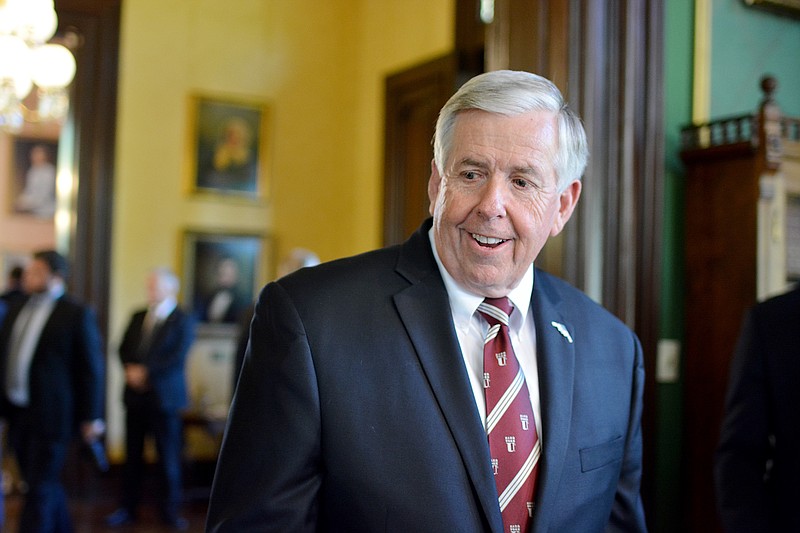Aug. 28 will be an important day for our great state and the state employees who serve Missourians every day - the merit reform law passed by the General Assembly during this year's legislative session will go into effect. This law will help improve how the State of Missouri government operates for the benefit of our citizens and our committed public servants.
Thanks to Senate Bill 1007, we can move forward with meaningful management changes to make a positive impact upon state government's most important asset - our colleagues in public service.
The merit reform goal is simple to give state government the common sense flexibility it needs to deliver for our citizens.
How? The law improves the state's ability to attract talented employees and also enables our employees to develop professionally as they succeed in their jobs and build new skills. Better recruitment and recognition means better teams. Better teams mean a better, more productive work environment. Those together mean better results for our citizens.
The General Assembly was convinced that the time had come for change. While the merit system has undergone updates in its 72-year lifespan, anyone familiar with it knows that it is terribly antiquated. What might have made sense in 1946 - when Harry S. Truman was president - no longer fits 21st century needs.
Too often, the old merit system was "merit" in name only, but not in practice.
For example, under the merit system, state agencies were required to hire from a restricted number of applicants - and that list often did not include the people with the most relevant skills and experience. Instead, an outdated examination process restricted who could be hired and who couldn't. These exams could have little relationship to the realities of what the jobs to be filled required. Imagine not being able to hire the best-qualified applicant because that person does not fit outdated criteria.
What organization today would ever think of putting in place such cumbersome processes? What organization would impose restrictions that prevent recruitment of top talent and slow down how someone can shift their work responsibilities as the situation demands? What business would ever adopt such policies? What university? What nonprofit? What government?
Merit reform eliminates these problems.
We will be able to increase the talent pool of job applicants, and recruit, and hire the best-qualified applicants.
We will be able to move faster. In the past, it has taken up to 90 days to hire. Our average hiring time is over twice the national average. That's just too long - too long for the Missourian applying for a job and too long for an important job to remain unfilled.
We will make it much easier and more efficient for citizens seeking state employment to apply for jobs. The merit system is confusing and oftentimes requires meaningless paper processes. An applicant could receive up to six different packets of paperwork in one day because he or she was on six different merit registers trying to get a job.
We will also be able to simplify and streamline our application system. Consequently, we will be able to redirect the tens of thousands of hours of time Human Resources professionals spend annually on merit system paperwork to much more valuable tasks, such as recruiting great job candidates.
Like with any major change, a few misguided myths surround merit reform.
Let's be clear - merit reform does not change state employees' health and retirement benefits, annual or sick leave, overtime or state holidays. State workers still have their whistleblower and other statutory protections.
And, it's certainly not about politicizing the state workforce. It's important to note that seven of our 16 executive departments have already operated outside of the merit system for years without such fears being realized.
The vast majority of state workers will come to work on Aug. 28, and do their jobs just as they did the day before. Just as we do today, if state employees are committed public servants who do their jobs and get better, then the State of Missouri is committed to them. That doesn't change.
We shouldn't, though, lose sight of merit reform's long-term impact. It is an important part of something bigger - our commitment to improve state government's performance so we are an even greater organization.
That's why we are also making other major changes to improve how we work together to deliver results for Missourians.
That's why we've created the Leadership Academy - a six-month leadership training course to develop emerging leaders in state government. That's why we just launched our new The Missouri Way management training program. We know that we need to invest in our leaders to get the job done. That's why we are focused on other back-to-basics management reforms.
Our colleagues in public service at the State of Missouri are also our fellow citizens. All our citizens deserve and expect excellent service. We should have a high bar. We all invest our hard-earned tax dollars in our state government. We are expected to tackle current challenges in a 21st century way. Merit reform will enable us to improve how we recruit and manage our talent to produce better results for citizens. That's good for all Missourians.
Gov. Mike Parson is the 57th governor of the State of Missouri. Lt. Gov. Mike Kehoe is the 48th lieutenant governor of the State of Missouri.

